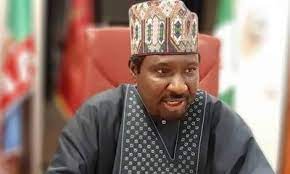Assistant Comptroller General of Customs, Charles Edike on assumption of duty as the Coordinator, Zone A of Nigeria Customs Service, recently embarked on tours of the various commands in the zone.
DAVID AGBA reports on the interaction he had with select journalists after the exercise
What strategies have you put in place to boost revenue collection in spite of the low-level of imports in the country?
For low-level of imports, there is nothing Customs can do about that. We don’t import, we can only collect duty on imports made. Throughout the tour, I told officers that every problem has a solution, that if last year we had the challenge, initially, after clearing the remnant of the previous year in January, February, we will wait until import start. But by March there was no budget so agents were just watching government direction before they work. As we were doing that, the election fever came up and from there, exchange issue went up, then, the 41 items out of foreign exchange participation came up. That compounded the challenge, but then, I said to them that if we had the challenge last year, by now we should have found solutions. I told them that even apes, when confronted with problems, think, and get answers. Even birds, some of them that would bring twigs poked into dead woods and bring out scrubs. So, if birds can think to do that and if apes can make tools to use, if ants will know this is water and build bridge for them to pass, then, we as human beings should think of solutions to problems.
Part of the way round first of all, is that we need to be a lot more disciplined than last year. Items that we thought were of no significance last year, thinking the money is not big and ignore it, cannot be so again, because every kobo must be brought into records. If you remove one kobo from one billion, it is no longer one billion. Also, if A brings in one kobo, B brings in one kobo; C brings in another one kobo, adding all of that would have gone a long way. Therefore, no Demand Note (DN) is too small, no duty is too small. I told them that those in bonds should go into their records, all those bonds they had not discharged, bring them out and let the people pay.
Has the tour of the various commands in any way impacted on the performance of officers ?
We have toured the commands under the zone twice now, and it was basically to express appreciation to the officers and to ask them to do more, because when you thank somebody that is doing well, there is a very strong possibility that the person will do more. When you don’t appreciate a child, he will just remain where he is.
Even after the tour, I still kept tab on Apapa and Tin Can, and up till the last working day of December 2015, I was still pushing Apapa and Tin Can because every additional kobo will certainly make entry into Federal Government revenue. It is only fair and proper for us to once again go back and appreciate them and urge them to do much more this year, after the push in December. Considering the dwindling oil revenue every day, public view have shown that when Mr. President makes comment on revenue, his attention is on Customs revenue and we cannot but work hard, so that we don’t disappoint him, so we don’t disappoint the CGC, and even Nigerians.
Like I told officers on the field, when there is war in any country, the country looks up to the soldiers for defence, so, now, Nigeria needs money, Nigeria cannot but look up to Customs and we cannot fail the country.
That is why I ask the commands to recite the first two lines of the National Anthem ‘Arise o compatriot, Nigeria’s call obey’. I told them, ‘look, Nigeria is calling on us now, will we fail Nigeria? Will we answer Nigeria’s call? Will we stand in the gap for Nigeria?
That was basically the crux of the tour and also to see what challenges they are facing in terms of equipment or other challenges that could hinder their work.
In all the places, officers were very ready to put in their best because of the encouragement they received. You will recall that twice now, Western Marine had made seizures;350 frozen poultry products, the 4,500 kg of marijuana. And of course, the controller testified that our visit was a big motivation to them. Also at Tin Can Island Command, the arms and ammunition that were seized. In all the Commands we visited, we draw their attention to national revenue and to national security; that without national security there is no way we can get national revenue because even only one gun with one bullet can cause havoc in the country, can destroy a family and can destroy a community, a state.
What is Customs doing about the state of the scanners, most of which have been grounded and the constant server failure at the port?
On scanners, the service providers particularly in Apapa, handed over dead scanners because before they left, the scanners were due for service but nothing happened. By the time they were handed over to Customs, we had a challenge because of the three levels of maintenance we can only do two levels, while one must be done by the manufacturer. The manufacturers on their part, said they don’t know us, that it is the service providers they had agreement with. \
The service providers were not forthcoming, so there was that challenge. At a time, we brought some foreign experts to come and work on the fixed scanners, and they came, but after two weeks the thing collapsed again. Along the line, our officers worked on them and they started working. I must add that the CGC is working very hard on issue of the scanners and listening to people, organisations to solve the problem once and for all because once the scanners are working, it goes a long way to better the time and cost of doing business in the port when you are able to scan about 500 containers in 24 hours. At a time in Apapa, we had day and night shifts when the scanners were all working; the fixed and mobile scanners then. So, at times, day and night, we could do between 450 to 500 containers daily. We will definitely get back to that point when the mobile scanners are all fixed. On the issue of server, we also depend on the giants of telecommunication in Nigeria.
We link up to them, so, if they fall, we fall, and when they are functional, we also are. It is just like when people experience difficulty in making calls because of network fluctuation. But by and large, the service is doing its best to be able to assuage some of those problems associated with network fluctuation. You will recall that before 2014, it was far worse than now, until in Apapa, we installed a 160-metre communication tower, which made things improve significantly.



